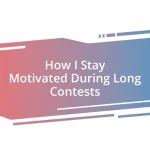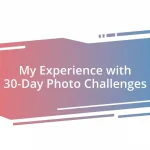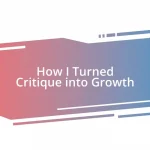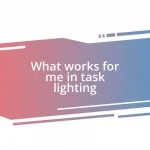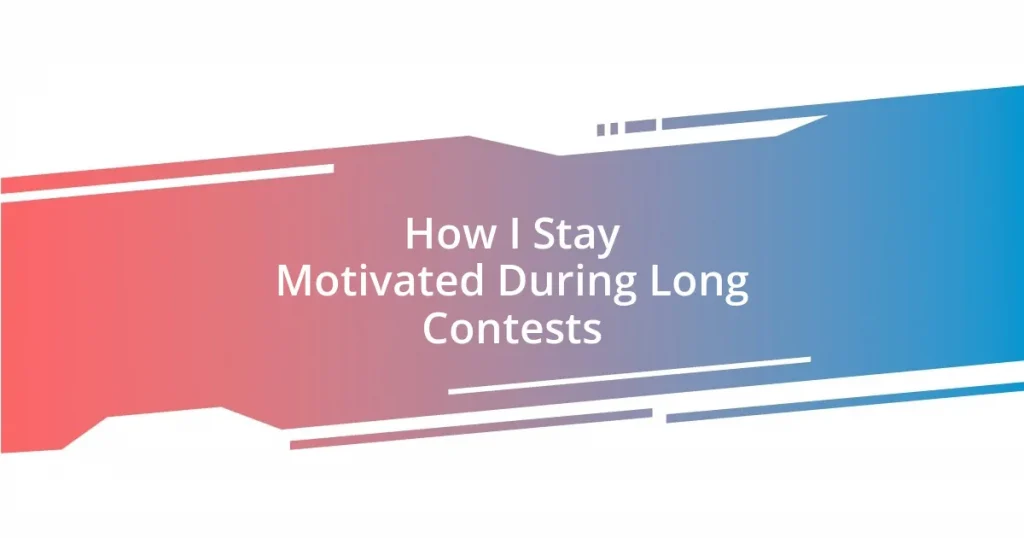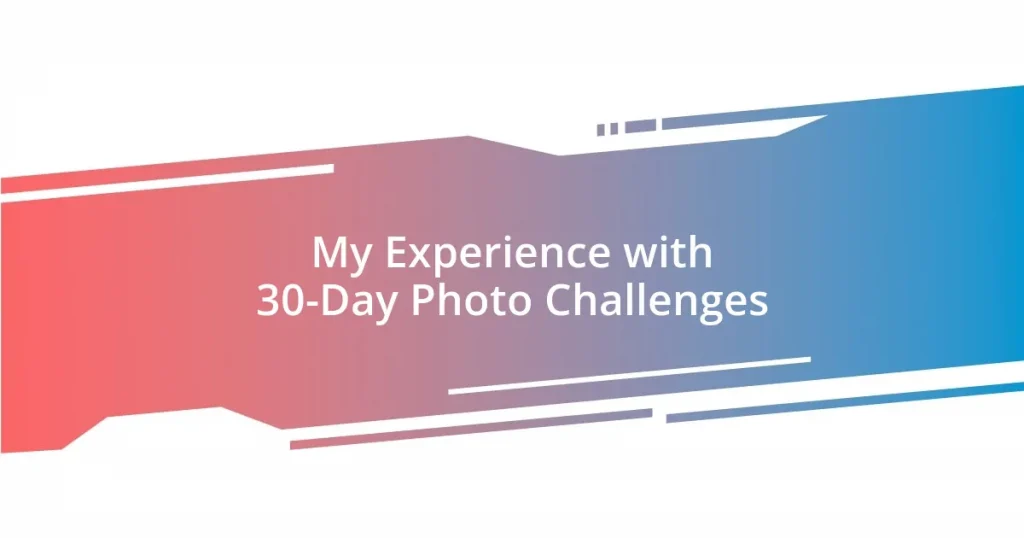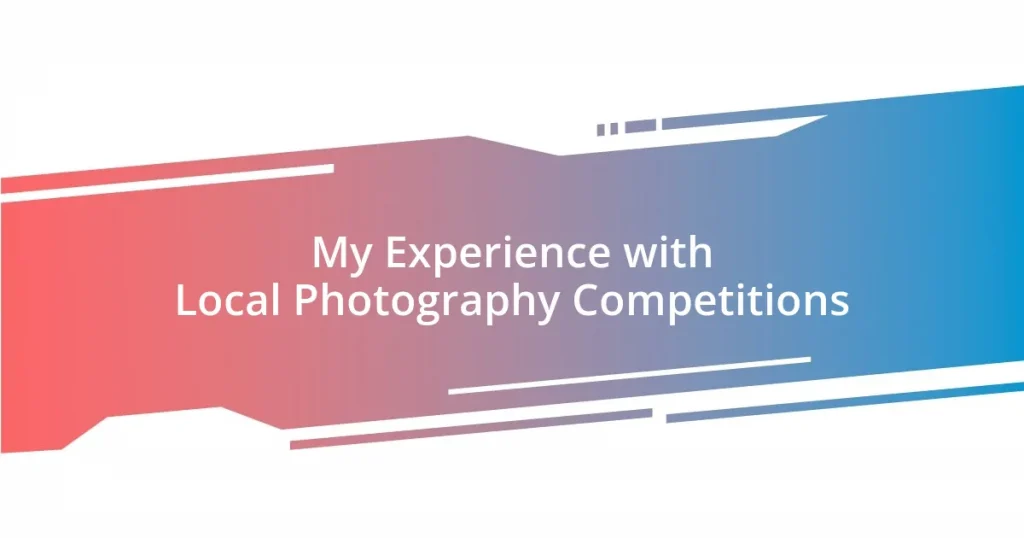Key takeaways:
- Setting smaller, achievable goals helps maintain focus and energy during contests.
- Establishing a consistent routine and taking effective breaks can enhance productivity and creativity.
- Building a support system through like-minded individuals and mentorship is crucial for motivation and overcoming challenges.
- Reflecting on past contest experiences aids in resilience and adaptability, creating a toolbox of strategies for future challenges.
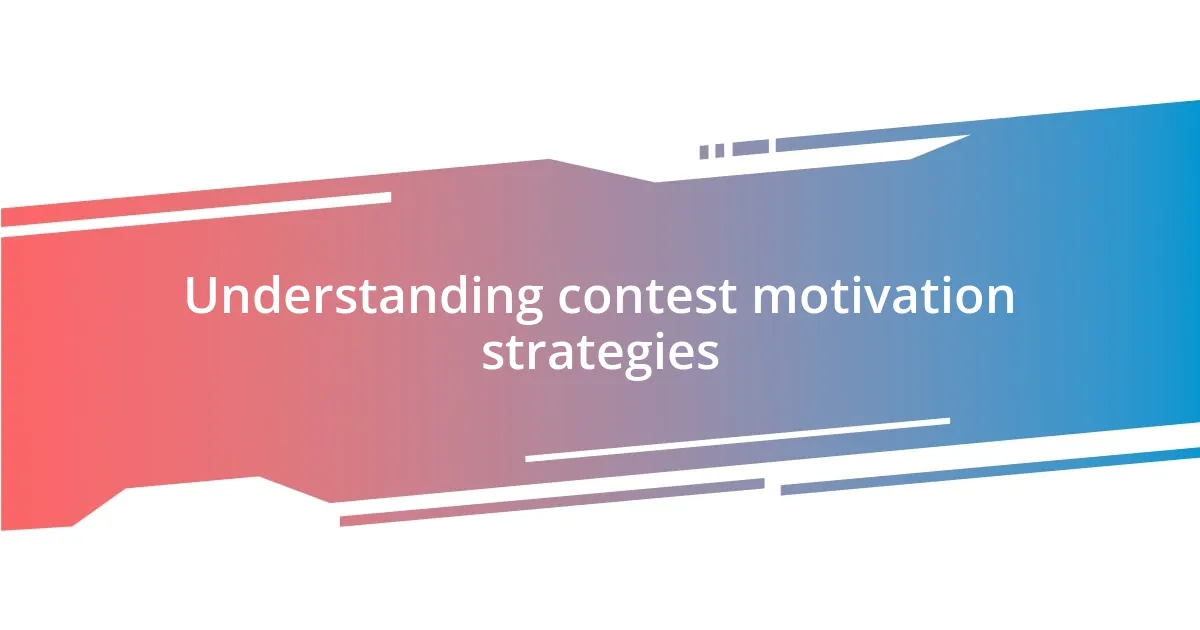
Understanding contest motivation strategies
One strategy I often rely on is setting smaller, achievable goals within the broader context of the contest. For example, during a marathon coding competition, I broke down the tasks into manageable segments. It kept my energy levels high and helped maintain focus, making it easier to see progress with each completed section.
I’ve found that surrounding myself with other motivated participants can significantly enhance my drive. There was a time when I participated in a contest with friends, and the energy was infectious. When I saw them pushing through tough moments, it inspired me to dig deeper and stay engaged with the challenge. Doesn’t a supportive community just elevate your motivation?
It’s also crucial to remind myself of the reasons I entered the contest in the first place. Reflecting on my personal journey, I recall entering contests to grow my skills and connect with like-minded individuals. Keeping that ‘why’ in the forefront helps me persevere during challenging times. Have you ever stopped to think about what truly drives you? Revisiting those motivations can spark renewed enthusiasm.
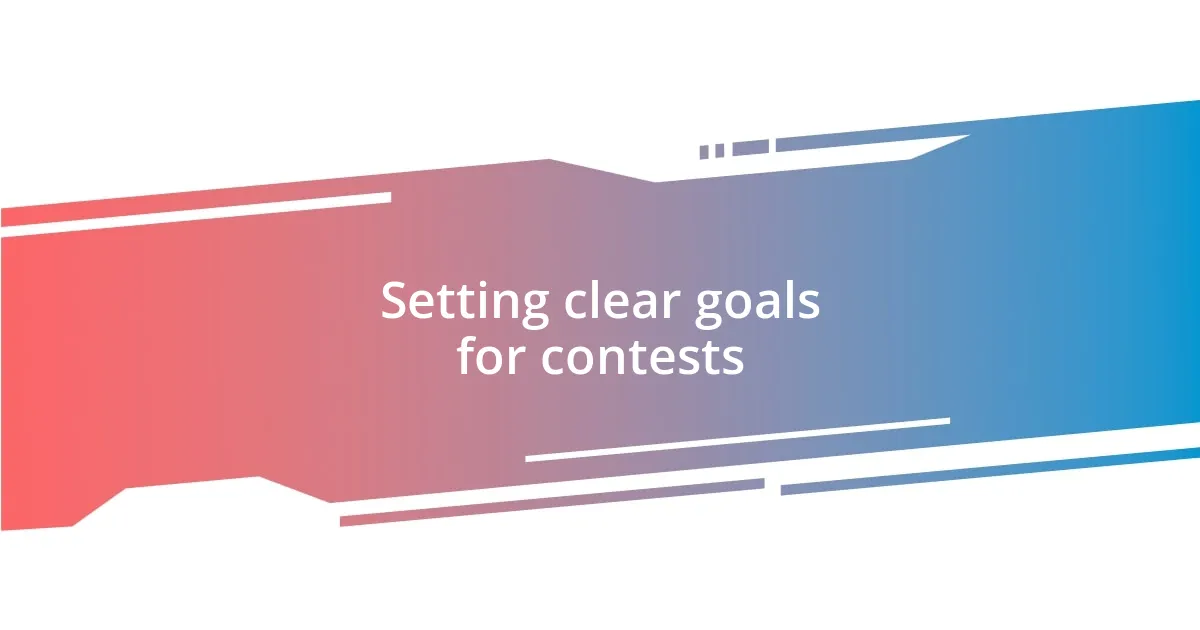
Setting clear goals for contests
Setting clear goals is fundamental to staying motivated during long contests. I remember a particularly challenging hackathon where I set goals that were not only specific but also time-bound. I visualized my objectives for each hour, such as completing a feature by noon. This clarity transformed the overwhelming task into a series of smaller challenges—each victory felt exhilarating and propelled me forward.
Breaking your goals into bite-sized pieces creates momentum. For instance, instead of just aiming to “finish the project,” I focused on milestones like designing the user interface or implementing the database. Each completed task felt like a mini-win, and sharing these accomplishments with my team added to the collective motivation. It was empowering to witness everyone’s progress; we cheered each other on, reinforcing the idea that every step, no matter how small, was worth celebrating.
Additionally, I emphasize the importance of adjusting goals as needed throughout the contest. Flexibility can be a game changer. In one instance, I found myself overestimating my capabilities, leading to overwhelming stress. By reassessing my goals to reflect more realistic expectations, I found relief. This adaptability allowed me to manage my energy sustainably and kept me engaged with the contest’s overall flow.
| Goal Type | Description |
|---|---|
| Specific Goals | Clearly defined objectives that focus on a particular aspect of the contest. |
| Time-Bound Goals | Goals that have a set timeframe for completion, creating urgency. |
| Milestone Goals | Intermediate steps that break the main goal into achievable parts. |
| Flexible Goals | Goals that acknowledge changing circumstances and allow adjustments to stay realistic. |
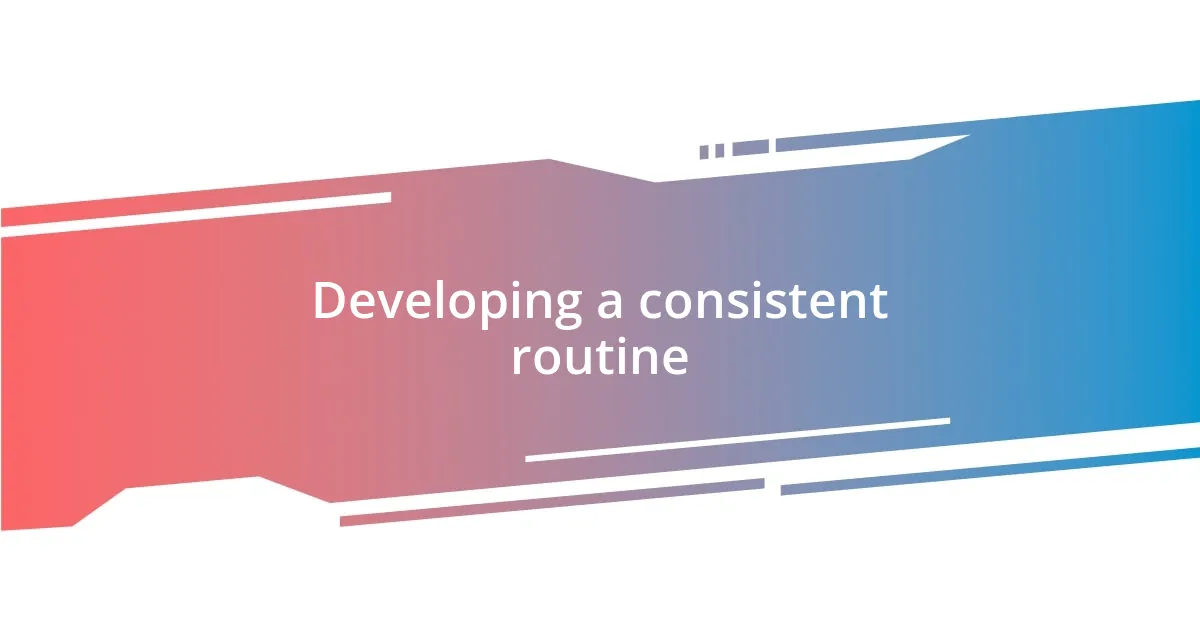
Developing a consistent routine
Establishing a consistent routine has been a game changer for my motivation during long contests. I remember one grueling coding marathon where I devised a schedule that prioritized my most productive hours. I usually hit my stride in the late morning, so setting aside that time for complex tasks made a noticeable difference. Sticking to a routine not only gave me structure, but it also reduced my anxiety. I felt like I was in control, tackling challenges head-on instead of being overwhelmed by the endless possibilities that contests often present.
Here are some key elements I include in my routine:
- Dedicated time blocks: Assign specific hours for focused work. I often spend two-hour chunks on coding tasks followed by short breaks to recharge.
- Consistent wake-up time: Rising at the same time every day helps regulate my body clock. It makes starting each contest day feel familiar and less daunting.
- Regular meal breaks: I make it a point to schedule meals. Eating balanced meals keeps my energy stable and mental clarity sharp.
- Mindful downtime: I incorporate short activities like stretching or meditation. These moments boost my mood and help refocus my thoughts before diving back into work.
- End-of-day reflection: I take a few minutes each evening to assess my progress. This habit solidifies what I achieved, reinforces my routine, and sets the stage for the next day’s tasks.
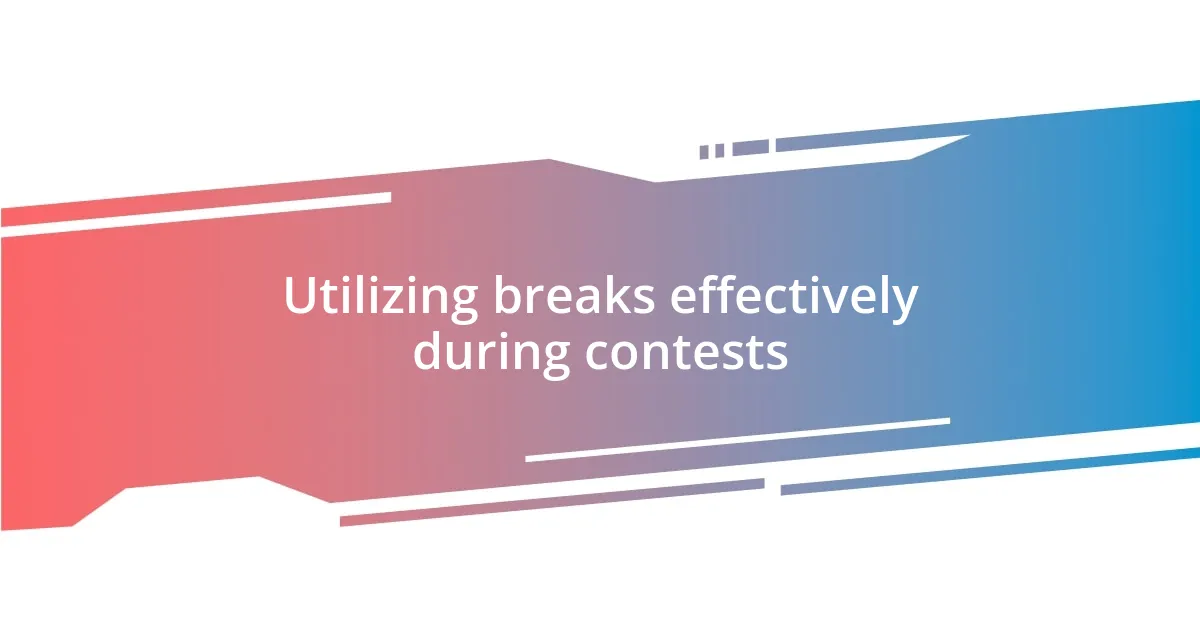
Utilizing breaks effectively during contests
Utilizing breaks effectively can be a secret weapon during lengthy contests. I’ve discovered that taking purposeful breaks fuels my creativity and prevents burnout. For instance, during one intense coding session, I stepped away for a quick five-minute walk. The fresh air and change of scenery cleared my mind, and when I returned, I found solutions I hadn’t seen before. Isn’t it amazing how stepping back can lead to breakthroughs?
I also like to incorporate activities that energize and inspire me during my breaks. Whether it’s listening to a favorite song or grabbing a healthy snack, these moments matter. I remember when I was deep into a project and started to feel fatigued; a simple five-minute dance to my favorite jam made me laugh and revitalized my energy. So, I have to ask, what activities bring you back to life during long hours of focus? Finding something that resonates can make your breaks not just a pause, but a source of renewal.
Lastly, I set a timer for my breaks to ensure I don’t lose track of time. Without this structure, it’s easy to let a five-minute break stretch into half an hour. I vividly recall a contest where I got caught up in a YouTube rabbit hole; I lost precious time and felt even more stressed upon returning. By monitoring my break durations, I can return to my tasks refreshed, not rushed. How do you measure your time during breaks to keep yourself on track? Finding that balance is crucial for maintaining motivation throughout those long contest hours.
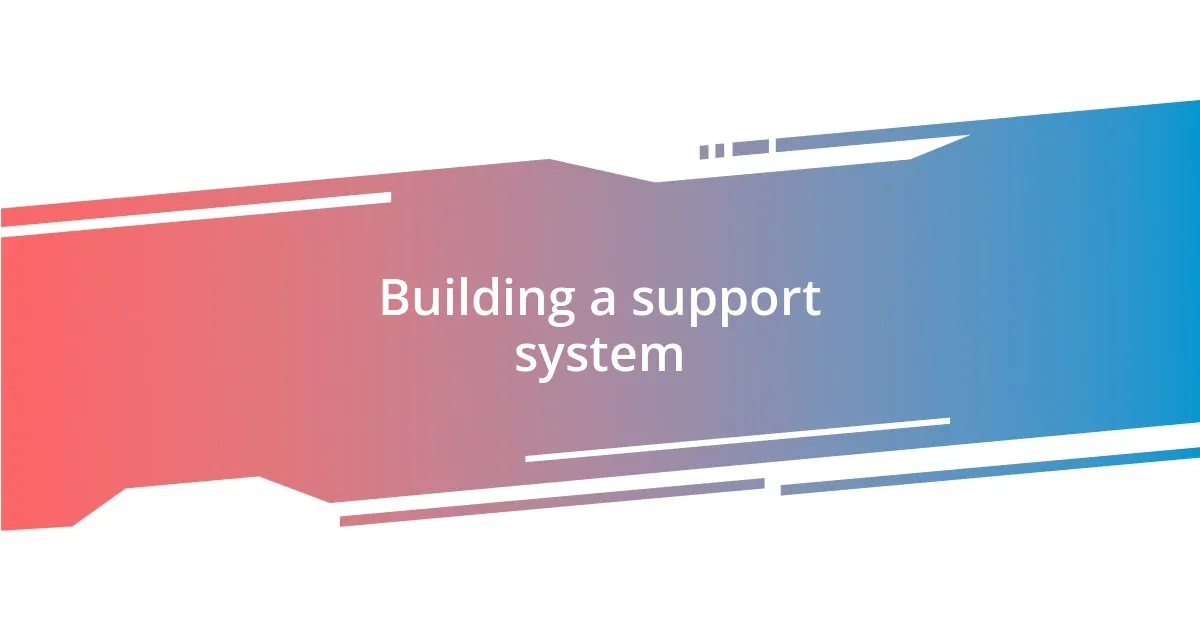
Building a support system
Building a support system during long contests has been a transformative aspect of my experience. I often reach out to colleagues or friends who understand the challenges I’m facing. A quick message to my buddy during a low moment can rejuvenate my spirits. I remember texting a teammate during a particularly tricky segment of a hackathon; her words of encouragement lifted me just when the self-doubt was creeping in. Have you ever had a moment when a simple message made a world of difference?
I believe surrounding myself with like-minded individuals is crucial. Joining online forums or local study groups allows me to share progress and celebrate victories together. I recall a contest where we organized group check-ins, and those sessions became a lifeline. Knowing others were navigating similar hurdles not only motivated me to push through but also made the entire experience feel less isolating. Isn’t it refreshing to realize you’re not alone in this journey?
Lastly, I actively seek out mentorship during these contests. Having someone experienced to turn to when I hit a wall can save hours of frustration. I can think back to a project where a mentor guided me through a complex algorithm I struggled with. Their insights were invaluable, leading me to solutions I wouldn’t have considered. How often do you think about reaching out to those who can help you grow? Building a support system may take time, but the benefits during challenging contests are immeasurable.
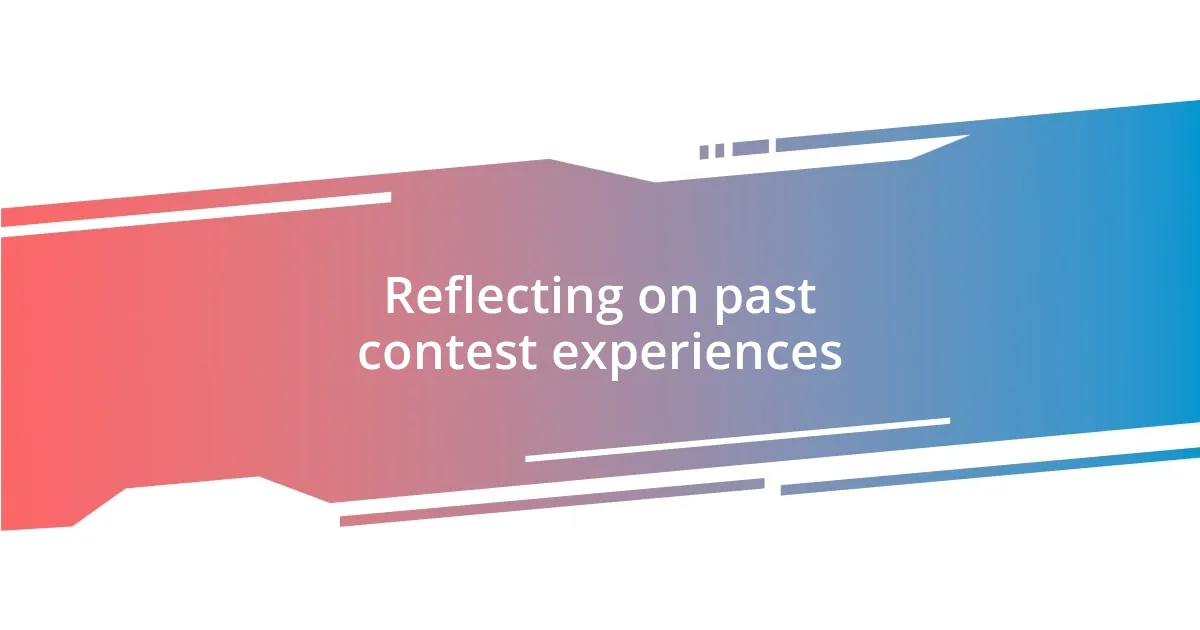
Reflecting on past contest experiences
Reflecting on my past contest experiences has taught me so much about resilience and adaptability. I remember a coding competition where I initially felt overwhelmed and discouraged. Looking back, I can see how crucial it was for me to jot down my thoughts and feelings as I went through intense moments. Did you ever try writing down your doubts? For me, it served as a powerful release and helped me strategize on how to tackle my challenges more effectively.
There’s a particular instance that stands out in my mind—during a marathon design contest, I hit a creative block that lasted for hours. It was frustrating! But in taking the time to reflect on previous successes, I discovered patterns in my thought processes that allowed me to pivot. By acknowledging what had worked well in the past, I regained my momentum and ultimately produced a piece that exceeded my own expectations. Isn’t it fascinating how our past can guide us through the present?
As I continue to grow from these experiences, I find myself mentally cataloging lessons learned, both good and bad. It’s like creating a toolbox of strategies I can revisit whenever I face new contests. Recently, I found myself in a particularly tough hackathon where my previous reflections helped me remember to stay calm under pressure. Have you ever experienced a moment where past lessons saved you? Reflecting on those tough times gives me a sense of empowerment, reminding me that every contest shapes my journey in meaningful ways.
